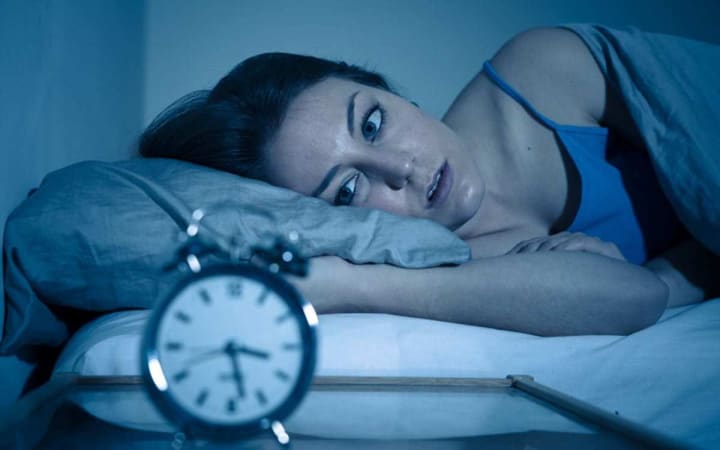Some Methods for Easily Falling Asleep
"Slumber Secrets: Unveiling Some Methods for Easily Falling Asleep"

A good night's sleep can significantly enhance your quality of life. People with good sleeping habits perform better academically, professionally, and even socially. However, a sizable portion of the population suffers from insomnia, which hinders their success. Several learning techniques aid in sleep.
A good night's sleep is crucial. It elevates your mood and promotes healthy bodily and mental functioning. Some folks have no issues falling asleep. However, a lot of people have a hard time getting to sleep and remaining asleep all night. Lack of sleep can negatively affect a wide range of bodily and mental processes, including memory, learning, emotions, mood, and many biological processes. Read on for some learning tips that will put you to sleep.
1. Take a Hot Bath
Around the world, taking a bath or a shower before night has long been a standard practice However, there was no concrete proof that it made it easier for people to fall asleep until recently when a study was published in the journal Sleep Medicine Reviews and the results were analyzed the University of Texas researchers. Researchers discovered that bathing in a hot bath between the temperatures of 104 and 109 degrees Fahrenheit about 90 minutes before bedtime could help you fall asleep a whole 10 minutes faster.
When we looked through all the studies, we noticed significant differences in the approaches and findings explained together, the only way to make an accurate determination of whether sleep can actually be improved was to combine all the past data and look at them through a new lens. Taking a warm shower or bath at this time improves the temperature circadian rhythm helping people fall asleep more quickly and improving sleep quality.
2. Shut Off Electronics
This advice should go without saying, but because our electronics are so exciting, it can often be more difficult to put into practice. In a recent study, those who read on an e-reader before bed needed 10 minutes longer to fall asleep on average. compared to those who were reading a book in regular print. You'll notice how much more sleepy you feel and how much faster you fall asleep if you try reading a real book at night rather than using your phone, watching TV, or using Netflix.
According to a Harvard study, reading from a screen before bed will make you feel drowsy and foggy when you wake up in the morning. People who did this stated that it took them longer the next day to completely awaken. Do yourself a favor and avoid all devices for at least an hour before bedtime in favor of those who read books on paper.
3. Don't Drink Afternoon Coffee

It is well known that drinking coffee can make us nervous and wired. You can feel the effects of caffeine as soon as 15 minutes after ingesting it since it enters your system through your stomach. Half of the caffeine you ingest is cleared from your system in around six hours, but it remains in your system for several hours.
Even a mid-afternoon cup of coffee can prevent you from falling asleep without your knowledge, according to science, which also demonstrates how the amount of caffeine in a single cup of coffee made in the same coffee shop can vary significantly. Because caffeine shortens deep sleep and prolongs light sleep, it can keep you up all night, even if you're used to an afternoon cup at home. This is because caffeine prolongs light sleep and increases the number of awakenings. Without deep sleep, restorative sleep is essentially impacted. A person will probably feel unfocused and more sleepy during the day, which necessitates drinking another cup of coffee.
4. Use Special Breathing Methods
Both yoga and meditation use the 478 breathing technique frequently. Empty your lungs, breathe slowly through your nose for four seconds, hold your breath for seven seconds, and then violently exhale through your mouth to perfect the technique. For eight seconds, make a wish sound while pursing the lips, then repeat it up to four times.
Dr. Andrew Whale, a well-known holistic health expert, and Harvard-trained physician, developed the approach. It not only improves thinking and reduces anxiety, but it also has physiological effects on the body. Because deep breathing causes your body to believe that your mind is relaxed, which in turn fosters a resting heart rate.
5. Brain Dump
For a variety of reasons, journaling is a useful habit to get into. It can help us work through issues and connect with our creative side, but journaling has other advantages as well. There are obvious advantages like an improvement in awareness memory and communication skills, but studies have also revealed that journaling can improve sleep. Scientific research has demonstrated that it is essentially an antidote for modern living. A higher IQ, a more robust immune system, and increased self-assurance.
Researchers from Baylor University and Emory University found that making to-do lists instead of writing about completed chores helps people fall asleep on average nine minutes faster—in roughly 16 minutes as opposed to 25—in a study of 57 young adults. In recent pharmaceutical clinical trials, participants who used sleep aids reported falling asleep 9 to 10 minutes more quickly than usual, so this effect size is comparable.
6. The Military Method
Although this tactic may seem extreme, forces from all over the world have been employing it for years. Military authorities developed the technique after realizing that many pilots were making horrible, avoidable mistakes as a result of stress and insomnia that resulted from it.
Even after clocking out, pilots were unable to unwind or sleep, which increased their tension and weariness to the point where they committed a deadly mistake. Relaxing your facial muscles is the first step. Include your tongue, mouth, and the muscles surrounding your eyes. Next, lower your shoulders as far as they will go. Next, relax your upper and lower arms on one side, then the other. The third step is to exhale. Next, relax your chest. Lastly, relax your legs. After ten deep breaths, start with your thighs and then your lower legs. Studies have shown that this strategy is effective after just two minutes, therefore the next step is to thoroughly empty your mind.
7. Don't Eat Before Bed
Many people indulge in a midnight snack before bed as a guilty pleasure, but this is not only harmful to your general health. You might wake up at night from it. While attempting to transition back into sleep mode, certain meals and beverages function as stimulants that force your body into digestion mode. The obvious culprit is caffeine, but other culprits include heavy foods like meats and cheeses that act as stimulants as well as proteins and foods high in MSG.
8. Exercise During the Day
Exercise is healthy for your body, mind, and sleep, but for some people, exercising too late in the day can interfere with their sleep. can obstruct how well they are able to sleep at night. Although "we may never be able to pinpoint the mechanism that explains how the two are related", researchers still don't fully grasp how physical activity enhances sleep. According to Charlene Gamaldo of Johns Hopkins, in a recent study, researchers found that participants who exercised indicated their sleep quality had improved, changing their classification from bad to good sleeper.
Exercise can reduce stress and the symptoms and intensity of both anxiety and depression. They also reported fewer depressive symptoms, more vitality, and decreased daytime sleepiness. Regular exercise aids in the production of endorphins, proteins that promote the formation of new nerve cells, and other biological changes that can help you manage your emotions and fight anxiety and mood disorders.
When dealing with sadness and anxiety, exercise can also provide you with a feeling of routine and self-assurance. Exercise-induced sleep improvements have also been shown in the older population, which is particularly significant because sleep disorders grow more prevalent as people age.
9. Aromatherapy
Aromatherapy cannot treat insomnia or its underlying causes, but utilizing calming and relaxing essential oils before going to bed may speed up the process. Experts advise spreading one of many essential oils in your room or in the bathtub before you go to sleep to help you stay asleep until your planned wake-up time. Lavender, lemon, bergamot, sage, and jasmine are some of the oils.
10. Read a Book
Recent research has demonstrated that reading dramatically improves sleep quality and reduces stress. According to the study, reading a good book before bed can lower stress levels by up to 68%, which is a higher percentage than that observed in other popular evening rituals like drinking tea, listening to music, or taking a stroll.
The researchers discovered that six minutes of reading is all it takes to considerably relax your body and mind, making reading in bed unnecessary. Use a small book light that attaches to the book you're reading and directs a focused stream of light onto the pages instead of an overhead light or bright task lamp. These have the added bonus of keeping your bed companion in the dark in terms of wattage. The national sleep foundation advises keeping it between 50 and 60 watts or lower. According to Dr. J. Todd Arnedt, who oversees the University of Michigan Medical School's behavioral sleep medicine program.
Reading is a peaceful, sedentary activity, so the underlying sleepiness manifests itself there. It's not that reading causes something to happen in the brain.
11. Tell Yourself To Stay Awake

When trying to get to sleep, people with insomnia frequently notice the same things happening night after night. They take a quick look at the time, get up to check on their kids or pets, and mentally go through their to-do list for the next day. In 2003, the findings of a sleep study on insomniacs were published, and they revealed that subjects instructed to push themselves to stay awake were unable to do so. The study had 34 insomniacs who were split into two groups.
The first group was told to try to fall asleep as naturally as possible, while the second group was told to stay awake. They were told to lie in bed with their eyes open and to remain still, and they were not allowed to use any outside stimuli to stay awake, such as television and computers. The people who were trying to stay awake quickly fell asleep. In other words, striving to stay awake paradoxically makes you fall asleep.
12. Imagine a Peaceful Setting
Guided imagery, is another name for visualization. And a distant relative of hypnosis and meditation. may alter brainwave activity, and certain visuals that encourage the brain's transition to deep sleep can be taught.
You should first visualize in your mind's eye locations that you have been to and that made you feel incredibly calm and at ease. Imagine shutting your eyes and walking to that location again, taking in as much sensory information as you can, including the time of day, whether it was at the seashore, sitting in a favorite room, or hiking in the mountains. Before going to bed, spend some time picturing this location, including its colors, warmth or coldness, texture, sounds, and any people or animals that may be there.
13. Try a Classical Music
When it comes to taking the fast train to the land of Nod, Brahms, Mozart, Handel, and company might become your new best friends.
Numerous studies have shown that listening to specific genres of music, especially classical music, can enhance sleep quality and hasten sleep onset.
If classical music isn't your thing, there is a comprehensive selection of contemporary songs with tempos conducive to sleep. Please click the following link.
14. Before Going to Bed, Do Yoga.
A few minutes of soothing yoga at the end of the day can be precisely what your body needs to decompress before bed if you're exhausted. Studies have shown that practicing yoga before bed can assist patients with insomnia and enhance the quality of their sleep by enabling them to doze off more quickly and stay asleep for longer lengths of time.
Yoga promotes deep breathing and muscle relaxation, which is an excellent method for unwinding your body and mind. The next time you have difficulties falling asleep, try performing a few minutes of the child's pose or happy baby posture before bed.
Set Yourself Up For Faster Sleep
Finally,
Your physical and emotional health will both benefit from a restful night's sleep. But if you're having difficulties falling asleep, the stress it brings on can make it much harder to get some rest.
Whether you use progressive muscle relaxation or begin dimming the lights after dinner, make sure you have a comfortable mattress to sleep on.
About the Creator
Ahamed Thousif
🌟 Welcome to the realm of exploration, where communities come alive through the power of words! 📚✨ Join me as we embark on a journey to discover the vibrant tapestry of stories and Poems.
VISIT - "MY FOOD BLOG"
Enjoyed the story? Support the Creator.
Subscribe for free to receive all their stories in your feed. You could also pledge your support or give them a one-off tip, letting them know you appreciate their work.






Comments
There are no comments for this story
Be the first to respond and start the conversation.